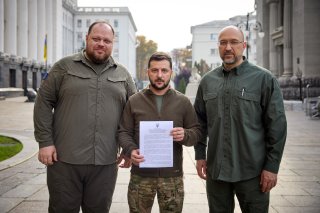Nine NATO Countries Back Fast-Track Membership for Ukraine
Most members of NATO have voiced support for Ukraine’s future entry into the alliance, but it is unlikely that its accession will occur during the war.
The leaders of nine NATO nations in Eastern Europe published a joint statement announcing their support for Ukraine’s membership in NATO, two days after Ukrainian president Volodymyr Zelensky announced his intention to apply for “fast-track” entry into the trans-Atlantic military alliance.
The presidents of the Czech Republic, Estonia, Latvia, Lithuania, North Macedonia, Montenegro, Poland, Romania, and Slovakia each signed the document. Seven of the nine countries were part of the Soviet bloc during the Cold War and were substantially controlled by the Kremlin until 1989, while Estonia, Latvia, and Lithuania were constituent republics within the USSR.
“We Presidents of Central and Eastern Europe, countries whose leaders have visited Kyiv during the war and witnessed with their own eyes the effects of Russian aggression, cannot stay silent in the face of the blatant violation of international law by the Russian Federation,” the nine heads of state wrote. “We reiterate our support for the sovereignty and territorial integrity of Ukraine [and] will never recognize Russian attempts to annex any Ukrainian territory.”
“We firmly stand behind the 2008 Bucharest NATO Summit decision concerning Ukraine’s future membership,” the statement continued—referencing a declaration at NATO’s annual summit in 2008, in which Ukraine and Georgia were confirmed as future members of the alliance.
Zelensky’s application to enter NATO came on the same day as Russian leader Vladimir Putin’s announcement that Moscow had annexed four areas in eastern Ukraine: the “Donetsk People’s Republic” and the “Luhansk People’s Republic” in the contested eastern Donbass region, as well as the Kherson and Zaporizhzhia regions in the country’s south. The latter two areas were occupied by the Russian military after its invasion on February 24, while the two proto-states in the Donbass region have been functionally independent from Kyiv since 2014.
Although the Russian government claimed that its annexation was supported by most local residents—following a “referendum” in each territory in which the overwhelming majority of votes were cast in favor of the move—the United States and most European nations have condemned the referendums as a fig leaf for Putin’s territorial ambitions.
Most members of NATO have voiced support for Ukraine’s future entry into the alliance, but it is unlikely that its accession will occur during the war. In order to enter the alliance, Kyiv would need the support of all thirty of its existing members, which could delay the application over political considerations—a step that Turkey recently took when Sweden and Finland applied to join. U.S. National Security Advisor Jake Sullivan emphasized on Friday that the Biden administration would continue to support “practical” measures for Ukraine, but advised Zelensky and his government to take up “the process in Brussels … at a different time.”
Trevor Filseth is a current and foreign affairs writer for the National Interest.
Image: Reuters.

